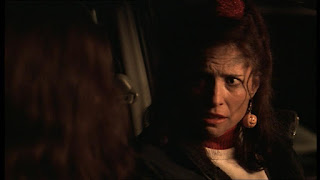What if a teenage girl got bitten by a werewolf? The metaphor is usually used to explore the bestial nature of adult men and the (sometimes sexual) violence they are capable of. That's present in Ginger Snaps as well, but the focus is shifted to girls hitting puberty – the lunar cycle explicitly linked to the menstrual cycle. Ginger becoming a werewolf drives new urges – to snog boys, smoke dope, fight bullies and ultimately to rebel against her family.
But that's only half of it. Ginger isn't really the main character – her younger sister Brigitte is, and the film is about their relationship and their toxic family environment. The two sisters are incredibly close, they have no friends and they are obsessed with death – perhaps as a fantasy of escaping their cloying family and dreary town. But Ginger is the instigator of their disturbing reiterated suicide pacts, and her lycanthropy only extends her control over Brigitte. In trying to manage her sister's transformation, Brigitte has to upend this power imbalance. She loves but is terrified of her sister, even before her werewolf problem. The final shot of the film tries to capture that very mixed emotion, as Brigitte finally gains her freedom.
But really the most moving part of the film happens earlier. For much of its running time, the mother is a source of brilliant comic relief. Her daughters find her attempts to engage with their problems ridiculous – even though the advice she gives (and that of the cheery school councillor) is eminently sound. Teenagers having to talk to adults about sex is always embarrassing, and displacing that with becoming a werewolf just highlights how out-of-touch parents might come across. But there's a great turn towards the end of the film, where the mother rallies around and chooses to sacrifice everything for the sake of her daughters, no matter what they've done. Brigitte accepts her help but is kind enough to say that it's not her fault. And then the mum says that it is, and apologises.
They are both right – Ginger is obviously out of control, but a parent shares some responsibility for their children's behaviour, even when they are doing their best. Despite baking the cakes, being supportive and making an effort, the mum has failed to nurture her daughters. She hasn't found a way to relate to them that can arrest their (self-)destructive behaviour. That's a tough lesson to absorb, and yet she does it and is determined to keep trying. That steely determination to stand by your children in the face of failure is admirable and very touching.



No comments:
Post a Comment